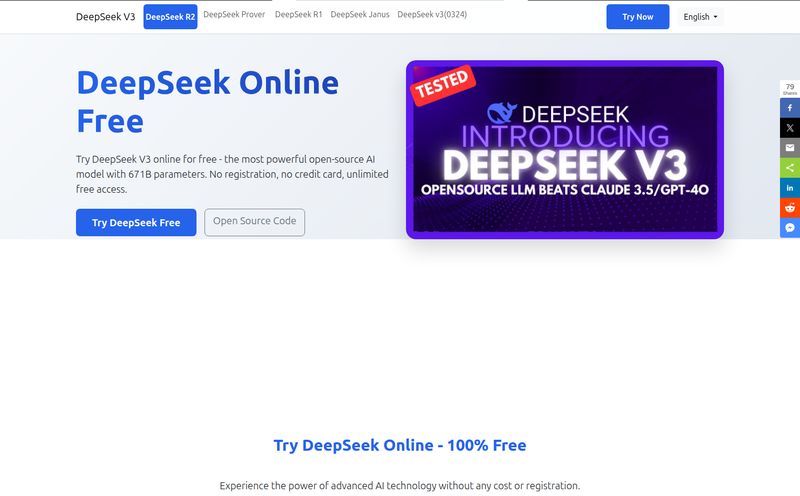I've been in the trenches of SEO and traffic generation for years, and lately, that means getting my hands very, very dirty with AI. Let’s be real for a second. Building a genuinely useful Generative AI application feels a lot like building a Frankenstein's monster. You’re grabbing an API from OpenAI over here, wrestling with a vector database like Pinecone over there, writing some janky Python scripts to evaluate outputs, and trying to manage your prompts in a chaotic Google Doc that has more conflicting suggestions than a family group chat planning a vacation. It's a mess. A powerful, exciting mess, but a mess nonetheless.
So, when a platform comes along claiming to be an “all-in-one LLM App Platform,” my inner skeptic, honed by years of snake oil salesmen in the marketing world, sits up and pays attention. That platform is Klu. And I’ve been digging into it. The question is, does it actually clean up the lab, or is it just another shiny tool for the shelf?
So, What Exactly is Klu? (And Why Should You Care?)
Let's cut through the jargon. Think of Klu as the central nervous system for your AI application. It’s a unified workspace where you and your team can build, test, deploy, and improve your LLM-powered features. It’s not just another API wrapper. It’s the entire workshop, from the blueprint station to the quality assurance line and even the paint shop for custom models.
It’s designed for AI Engineers and product teams who are past the “hello world” stage and are facing the very real, very frustrating challenges of taking a cool AI concept to production. If you’ve ever tried to figure out which of five prompt variations actually performs better with real users, or how to fine-tune a model on your own data without wanting to tear your hair out, Klu is speaking your language.
The Core Features That Actually Matter
A platform can have a million features, but only a few really move the needle. From my perspective, here’s the stuff in Klu that genuinely addresses the biggest headaches in AI dev.
Collaborative Prompt Engineering That Doesn't Suck
I can’t be the only one who has lost track of which prompt is the “latest” version. Is it `prompt_final_v2_Johns_edit.txt` or `prompt_final_v3_USE_THIS_ONE.txt`? Klu brings sanity to this process. It's like a Git for prompts. You can explore, version, and track changes to your prompts in a structured way. Team members can see the history, compare performance, and collaborate without stepping on each other's toes. This alone is a massive quality-of-life improvement.
Automated Evaluation and A/B Testing
This is huge. The traditional loop of 'tweak prompt -> run a few examples -> eyeball the results -> repeat' is slow and wildly unscientific. Klu automates this. You can change a prompt or swap out an entire model (say, from GPT-4 to Claude 3 Sonnet) and get automatic evaluations on how it affects the output quality. It allows you to run A/B experiments and get actual data on what works. It’s the difference between guessing and knowing, and in business, that difference is everything.
One-Click Fine-Tuning: The Holy Grail?
Off-the-shelf models are great, but the real competitive advantage—the “moat,” as they say in Silicon Valley—comes from creating something unique. Fine-tuning an LLM on your own proprietary data is how you do that. Klu aims to make this notoriously complex process as simple as a click. It helps you curate data from user interactions and then fine-tune models like GPT-4 or Llama 2 to create a custom-tailored brain for your application. This is how you build an AI that truly understands your customers and your business context.
The RAG and Data Integration Piece
An AI without relevant, timely data is just a clever parrot. Klu gets this. It’s built to integrate with your existing data sources, whether that’s a database, a folder of PDFs, or entire websites. This is the foundation of Retrieval-Augmented Generation (RAG), the tech that lets your AI answer questions based on a specific body of knowledge. Klu streamlines the process of connecting your data to your model, which is frankly where a lot of projects get bogged down.
Let's Talk Models: A Playground of Possibilities
One of my biggest pet peeves is getting locked into a single ecosystem. Klu is refreshingly model-agnostic. You’re not just in the OpenAI or Anthropic sandbox. You have access to a whole suite of best-in-class models:
- Claude Family (including the new hotness, Claude 3)
- OpenAI's GPT models (including GPT-4 Turbo)
- Llama 2
- Mistral
- Cohere
This is more than just a nice-to-have; it's a strategic advantage. You can benchmark different models for your specific task to see which one gives you the best blend of performance, speed, and cost. Maybe Claude is better for creative writing, but Mistral is faster and cheaper for classification tasks. Klu lets you test that hypothesis quickly and easily.

Visit Klu
Who is Klu Really For?
So, should every single person playing with AI sign up? Probably not. If you're a student just learning the ropes of the OpenAI API for a personal project, this might be overkill. Klu really shines for teams. It's for the startup trying to launch an AI-powered feature that will define their product. It's for the established company that needs to build, monitor, and secure enterprise-grade AI applications.
In my opinion, if you're a team of two or more working on an LLM app that you intend to ship to real users, you're going to feel the pain points that Klu solves. If you're a solo AI engineer who values speed and structured workflow, teh Pro plan is a pretty compelling entry point.
The All-Important Question: Klu Pricing
Alright, let's get down to brass tacks. Money. Klu has a tiered pricing structure that seems pretty well thought out for its target audience. There isn't a free-forever plan, but the entry-level Pro plan includes a trial for your first app, which is fair.
| Plan | Price | Best For | Key Features |
|---|---|---|---|
| Pro | $30 /month | Individuals & Research Projects | 300 Daily Runs, 1k RAG Docs, 3 Projects, User Feedback Capture |
| Scale | $997 /month | Small Teams & Feature Optimization | 10k Monthly Runs, 100k RAG Docs, Team Collaboration, A/B Experiments, Versioning |
| Enterprise | Contact Sales | Large-scale Deployment | 100k+ Runs, Unlimited Projects, Private Cloud Option, SOC2, Dedicated Support |
The Pro plan at $30/month is a fantastic entry point. It's priced accessibly enough for a dedicated individual or a small team to prototype and validate an idea. The jump to the Scale plan is significant, but so are the features. This is where you get the serious team collaboration and optimization tools like A/B testing and versioning. The Enterprise plan is for the big leagues, with a focus on security, compliance (SOC2), and scalability, including private cloud or self-hosted options which is a must-have for many large organizations.
My Final Verdict: Is Klu Worth the Hype?
After digging in, I'm genuinely impressed. Klu isn't just adding to the noise; it's providing a coherent signal. The biggest advantage is simple: it's an integrated system. It replaces the precarious stack of disparate tools with one platform where the pieces are designed to work together. The workflow from prompt experimentation to data integration to fine-tuning and evaluation is logical and streamlined.
It's hard to find a major downside. The main consideration isn't a flaw in the product, but a question of fit. Do you need this level of orchestration yet? If you're building serious AI apps, my answer is a resounding yes. The time you save by not having to build and maintain your own internal tooling stack will almost certainly outweigh the cost.
Plus, a fun little easter egg: their footer says Klu stands for “K-human Likeness Utility.” I don’t know what that means, but it has the perfect level of endearing tech-nerd energy that makes me trust them a little bit more. They're not just building a product; they're nerding out about the future of AI. And right now, their utility looks pretty darn useful.
Frequently Asked Questions about Klu
Can I use my own private data with Klu?
Yes, absolutely. Klu is designed for secure data integration. You can connect to your databases, files, and other proprietary data sources. For maximum security, the Enterprise plan offers options for private cloud deployment or even self-hosting.
What Large Language Models (LLMs) does Klu support?
Klu supports a wide range of top-tier models, including those from OpenAI (GPT-4), Anthropic (Claude 3), Meta (Llama 2), Mistral, and Cohere. This allows you to test and deploy the best model for your specific needs without being locked into one provider.
Is Klu secure for enterprise use?
Security is a clear focus. The platform is built with enterprise needs in mind, offering features like roles and permissions, activity logs, and SOC2 compliance on the Enterprise plan. The private deployment options provide an even higher level of data control.
Is there a free trial for Klu?
The Pro plan, which is the entry-level tier, includes a free trial for building your first AI App and using its Actions. This lets you get a feel for the platform's core functionality before committing.
How exactly does Klu help with prompt engineering?
Klu provides a collaborative environment that's like a version control system for your prompts. You can save, track, and compare different versions, see their performance metrics, and work with your team in a centralized place instead of using messy documents or spreadsheets.
What is RLAIF and how does Klu use it?
RLAIF stands for Reinforcement Learning from AI Feedback. It's a method for improving models. Klu augments human labeling with RLAIF, which can help curate high-quality data for fine-tuning more efficiently and potentially at a lower cost than relying solely on manual human feedback.
Bringing Order to AI Chaos
Building with generative AI is often chaotic, experimental, and frustrating. It’s the wild west right now. What Klu brings to the table is a sheriff. It’s a system that brings structure, data, and collaboration to the frontier. It transforms the process from a mad science experiment into a repeatable engineering discipline. For any team serious about building a lasting competitive advantage with AI, a platform like Klu isn’t just a nice-to-have, it’s becoming a necessity.



